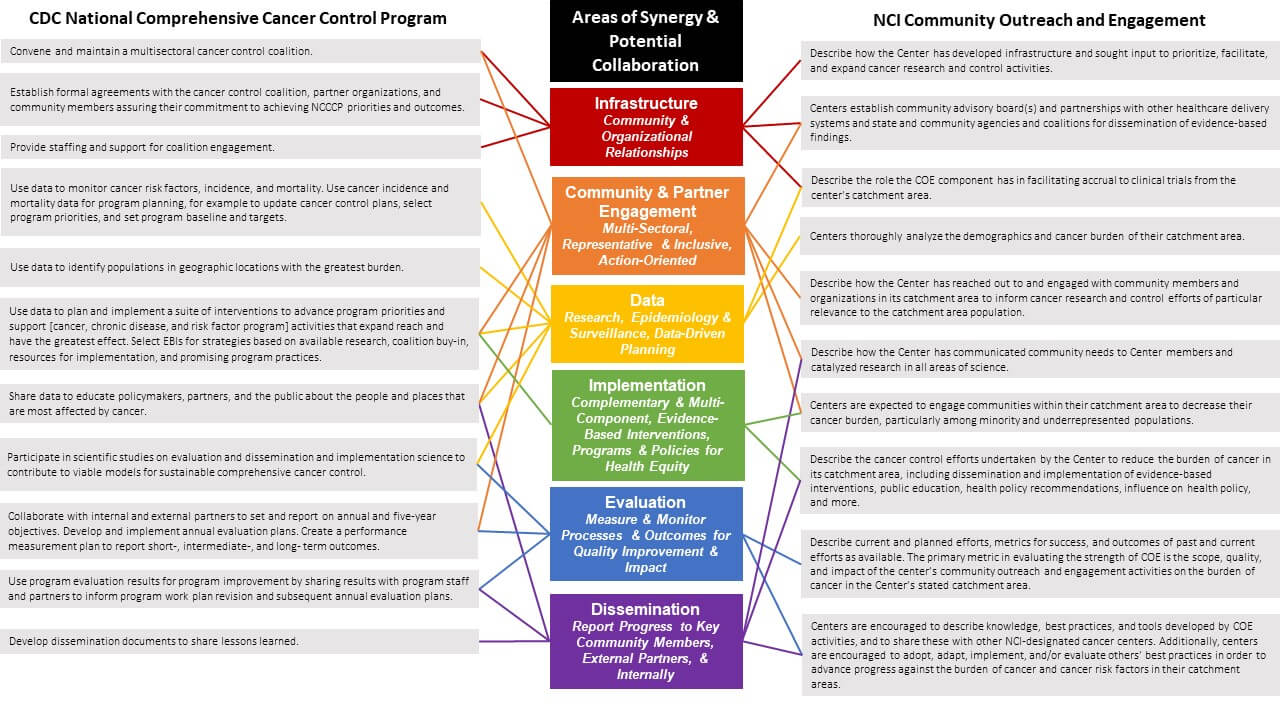Research-practice partnerships are essential for integrating evidence-based interventions and policies into health care and public health settings. Many National Cancer Institute (NCI)-Designated Cancer Centers are engaged in research-practice partnerships through their community outreach and engagement (COE) and population sciences activities. NCI has helped to stimulate some of this work through a series of cancer center supplements focused on translation of evidence-based interventions into community practice and on increasing COE activities and partnerships.
COE has been a fundamental activity of NCI-Designated cancer centers since the initiation of the cancer centers program in 1971 but became a more prominent requirement beginning with the 2016 reissuance of the P30 Cancer Centers Support Grant. One natural potential partnership for COE programs can be found in the Centers for Disease Control and Prevention’s (CDC) National Cancer Prevention and Control Program (DP22-2202), which funds the National Breast and Cervical Cancer Early Detection Program (NBCCEDP), the National Comprehensive Cancer Control Program (NCCCP), and the National Program of Cancer Registries (NPCR). The NBCCEDP provides breast and cervical cancer screening and follow-up for uninsured and underinsured individuals and implementation of evidence-based interventions in the clinics that serve them. The NPCR has implemented a population-based cancer registry program. In addition, the NCCCP supports cancer coalition efforts that use their individual and collective resources to plan and implement evidence-based strategies as described in jurisdiction-wide cancer plans. NBCCEDP and NPCR, along with CDC’s Colorectal Cancer Control Program, are critical partners of CDC’s NCCCP-funded cancer coalitions.
We believe there are clear intersections and synergies for potential collaboration between COE programs and CDC’s Division of Cancer Prevention and Control’s national programs, particularly with NCCCP cancer coalitions. Figure 1 highlights excerpts from the DP22-2022 funding opportunity from CDC and from the 2021 P30 funding opportunity from NCI highlighting multiple intersections in six domains, as described below.
- Infrastructure – CDC’s funded programs have formed multisectoral cancer coalitions including formal arrangements with partner organizations, and NCI’s COE programs are expected to form advisory groups and community partnerships. Representatives from each can serve in these mutually beneficial partner roles, fostering bidirectional communication.
- Community and partner engagement – The infrastructure supports community and partner engagement for both cancer coalitions and COE programs to facilitate input from diverse and underserved communities, needs assessment, research prioritization, as well as dissemination of evidence and education to various partners and the public.
- Data – Data undergird coalition and COE program decision making and progress monitoring. Select patient demographic and clinical data from cancer centers feed into the NPCR central cancer registries, which then informs cancer coalition planning, catchment area trends analyses, and identification and prioritization of disparities.
- Implementation – Both COE and CDC-funded programs have the opportunity to advance implementation of evidence-based interventions and open up conversation about structural racism and social justice to improve health equity and, ultimately, cancer outcomes. Coordinated and collaborative implementation has the potential to increase reach, efficiency, and impact.
- Evaluation – Implementation is monitored and evaluated against specific outcome objectives. CDC-funded programs are encouraged to evaluate the work they are doing as well as participate in dissemination and implementation (D&I) research when possible. The cancer centers are expected to conduct research projects where outreach to and engagement of communities informs and results in high-impact science. Authentic partnering with communities will serve the goals of cancer centers and public health to accomplish these complementary objectives.
- Dissemination – CDC- and NCI-funded programs are designed to enable sharing of the outcomes of their data collection and analysis, and implementation efforts with key community partners and policymakers, and use them to inform internal decision making. They are also encouraged to share findings and lessons learned with the wider society.
Figure 1. Areas of synergy and potential collaboration between the CDC-funded National Comprehensive Control Program and NCI-Designated Cancer Centers
In 2021-2022, to further establish synergistic links between cancer centers and key cancer control practitioners, NCI funded supplements to nine cancer centers designed to increase COE activities through partnerships between centers and coalitions. The long-term goal was to build greater connections between cancer centers and coalitions that would lead to translation of center research findings and products into use in clinical and community settings for improved cancer outcomes in the catchment area. Case studies sharing the details of the supplement partnerships and projects are available on our website. An in-depth evaluation of the initiative is planned for 2023 and will be disseminated widely.
Opportunities for Engagement
Connect with a NCCCP cancer coalition to ensure your implementation science efforts actively contribute to evidence-based public health practice. Visit NCI's IS team website to learn about NCI’s partnerships that facilitate and encourage collaboration between research and practice communities.
Aubrey Van Kirk Villalobos, DrPH, MEd, is a Health Scientist with the Implementation Science (IS) Team in the Office of the Director in the Division of Cancer Control and Population Sciences (DCCPS) at the National Cancer Institute (NCI).


Dispatches from the Implementation Science Team, is an episodic collection of short form updates, authored by members and friends of the IS team representing a sample of the work being done and topics that our staff are considering for future projects. Topics address some of the advances in implementation science, ongoing issues that affect the conduct of research studies, reflections on fellowships and meetings, as well as new directions for activity from our research and practice communities.



